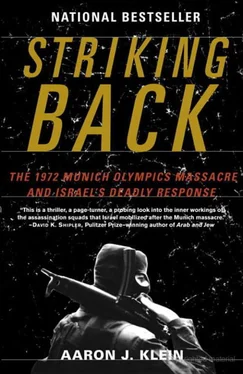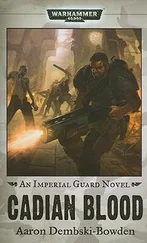Abu-Hassan joined the PLO prior to the occupation of the West Bank and Gaza Strip—a result of Israel’s crushing victory in the Six Day War in June 1967. As a protégé of Arafat’s, Salameh rose through the ranks with ease. The leader of the PLO saw him as kin, preferred not to notice Salameh’s self-indulgent lifestyle, and appointed him commander of his personal guard, Force 17, apparently so named after the extension number in the PLO’s headquarters in Beirut. Salameh spent as much time as he could with the ra’is. As son of the Palestinian Hassan Salameh, the shahid who had lost his life in battle against the Zionists, Ali wanted to go far.
When Ali Hassan Salameh was sitting for his interview, Israeli intelligence continued to grasp at straws. The civil war that erupted in Lebanon in 1975 worked both for and against the Mossad. On the one hand, deteriorating federal power made getting in and out of Beirut simple. On the other hand, the combatants were exposed to great risk in a lawless city with no rules and no judges, a regular rain of artillery and mortar fire, and the all-too-frequent sound of snipers’ bullets. The risk of catching a stray or well-aimed sniper bullet, or of simply being mistaken for a tourist and mugged at gunpoint, perhaps taken for ransom, was too great. Many assassination plans went unfinished. Even innovative and elegant operations were sidelined out of concern for the combatants’ safety. Most of the plans to kill Ali Hassan Salameh in the chaos of Beirut stopped at Mike Harari’s door.
After Spring of Youth, Salameh had grown cautious about his personal safety, hiring dozens of armed security guards. In the aforementioned interview, Salameh was unsparing in his criticism of the three men slain during that operation. “The enemy’s main victory—the assassination of three of our leaders in Beirut in April 1973—was the result of complete carelessness, which is typical of the Eastern mentality, the fatalistic mentality. My home was about fifty meters from the late Abu-Yussef’s home. The Israeli assassins didn’t come to my home for a very simple reason: it was guarded by my fourteen men.”
There is something profound beneath his sharp sentiments. Unwittingly, Salameh too was taken in by the Mossad myth. That legend told of an Israeli organization so cunning and capable it could strike down any Palestinian in the world in his bedroom. Internalizing the myth, Salameh believed that the Mossad knew precisely where his apartment was in Beirut—fifty meters from Abu-Yussef’s place—but was deterred by his fourteen armed guards, which they supposedly knew about. He never considered that the Israeli intelligence agency simply did not know where he lived, which explains why they never came to kill him that night.
Salameh tried to remain unpredictable in his habits. He kept loaded AK-47s in every room in his apartment. His boss, Yasser Arafat, was even more obsessive about safety, always maintaining an erratic schedule. He hardly ever spent two nights in the same bed. In an attempt to baffle potential assassins—both Israeli and other—he always left sleeping arrangements for the last minute. Although he was mentioned many times as a possible heir to Arafat, Ali Hassan Salameh was too lazy and far too devoted to luxury and pizzazz to abide by the gray edicts of purposefully erratic behavior.
His second marriage, this time in a white suit, only made him less cautious. In Beirut, on June 8, 1977, he married Georgina Rizak, a Christian Lebanese woman who had been crowned Miss Universe 1970. For Salameh, it was love at first sight, which hardly explains why he married the beautiful Rizak without divorcing his first wife, the mother of his two sons, Hassan and Osama. As a Muslim he was allowed more than one wife, he maintained. At any rate, Rizak kept him at home, night after night, in the Snobar section of west Beirut.
Salameh, thought to have been behind the Munich attack, was kept alive for years by virtue of his connection to the CIA. He was Arafat’s liaison with the spy agency, a secret channel enabling communications between the Palestinian leader and the American administration, which refused to publicly acknowledge the PLO. More than once, CIA operatives even offered to put Salameh on their payroll.
Up until the early 1970s the CIA was largely uninterested in the Palestinian side of the Arab-Israeli conflict. That changed after the brutal attack in Munich and, especially, after the execution of the two American diplomats in Khartoum at the hands of Fatah’s Black September. The CIA sought ways to infiltrate Fatah—the largest of the Palestinian groups. The agency wanted someone who could both warn them of imminent attacks against Americans in Europe, the Middle East, and the increasingly perilous city of Beirut, and dissuade Fatah from pursuing such targets. Ali Hassan Salameh was the man for the job. The CIA first made contact with him in 1969, in Beirut. A friend of Salameh’s introduced him to Robert C. Ames, a case officer working out of the American embassy in Lebanon. On at least two occasions CIA operatives offered Salameh a six-figure monthly salary to work as an agent. He refused. The American system—buying with vast sums of money—backfired with Salameh, wounding his pride. Salameh had no desire to be on the payroll; he wanted to change the thinking of the superpower that refused to recognize the legitimacy of the Palestinian cause.
From 1975 to 1976, during the early years of the civil war in Lebanon, the man affectionately know as “the Persuader,” for his capacity to solve problems and assuage enemy minds, provided protection for the American embassy and its staff in Beirut. It was he who, on June 20, 1976, safeguarded the long convoy of embassy staff as they fled to Syria when fighting broke out on the streets of Beirut.
Salameh’s connection with the Americans was on and off for ten years. He probably visited the United States twice: once as a member of Arafat’s entourage, when the ra’is delivered his famous speech from the U.N.’s podium, and again in 1976, when he went undercover to meet high-ranking administration officials in Washington, and from there, with Rizak, at the time his girlfriend, to New Orleans and Hawaii. The trip, apparently on the CIA’s generous tab, was part of their failed recruitment effort.
As far as Salameh was concerned, his connection with the Americans was his ace in the hole, his life insurance policy. The Americans would keep the Israelis at bay. But it was not that simple. The Israelis played with a different hand; his ace in the hole was useless. In May 1977 Prime Minister Menachem Begin came to power and reissued the authorization given by his predecessors to assassinate Ali Hassan Salameh.
In mid-1978 Mossad officials held a standard meeting with their American counterparts at CIA. “Did it ever work with Salameh?” a senior American official was asked, referring to the attempts at recruiting him.
“No,” he said, shaking his head. “Everything failed…”
The Mossad interpreted this as a green light for assassination. Once the Americans had given up their efforts, they figured, he was fair game. The different branches of the American and Israeli intelligence agencies were already then in close contact. SIGINT, signal intelligence of telecommunications, was shared and efforts were made to ensure that HUMINT sources were not approached by both sides. Several times a year Mossad and CIA representatives convened for sessions on terrorism that went far beyond the everyday cooperation and exchange of information. The Americans would understand Israel’s need to eliminate the terrorist.
From an Israeli perspective, Ali Hassan Salameh was one of the planners of Munich, period. Dozens of senior ex-Mossad and ex–Military Intelligence officers emphasized, over the course of our conversations, that the intelligence pointing to his involvement was both very strong and diverse. One senior officer told me that Salameh continued to plan terror attacks in Israel well after Munich and after the European theater quieted. Salameh, he said, was the man in Arafat’s office who would translate the ideology into action, making the calls from headquarters to operatives in the field.
Читать дальше












